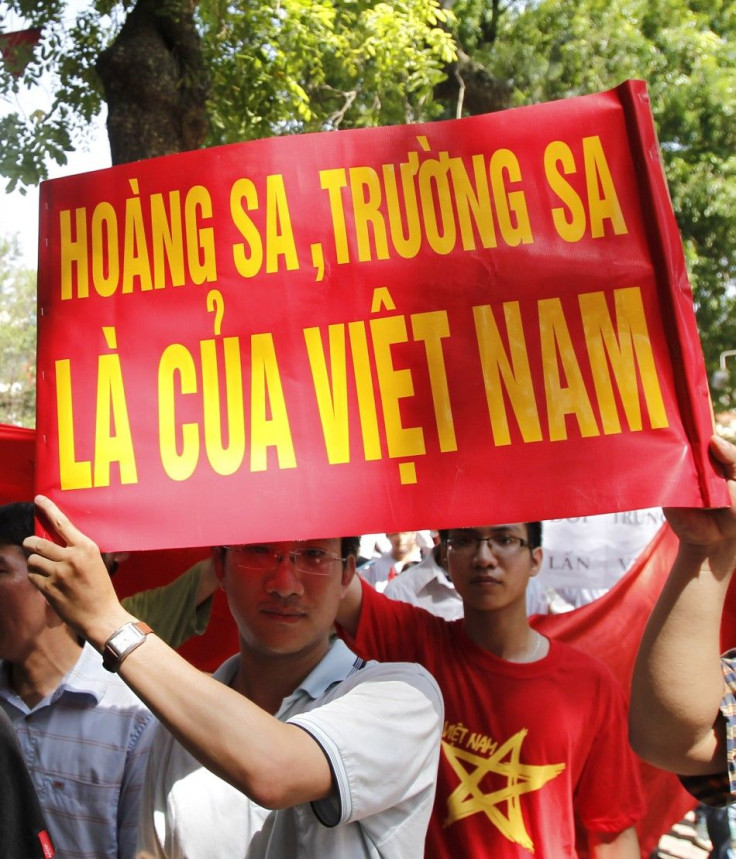Sino-Vietnamese tensions boil over South China Sea

China's constant search for natural resources to fuel its burgeoning economy has driven Beijing's helmsmen to the far reaches of Africa, South America and the embattled Middle East.
But bubbling beneath the South China Sea-just off China's shared coastline with Vietnam-- are vast oil deposits, well-exceeding 80 percent of the entire Saudi kingdoms' reserves, according to Chinese estimates.
It's no wonder that China and Vietnam are up-in-arms over such a lucrative stretch of water space. But some analysts are saying that the escalating imbroglio between the two socialist nations could soon boil over.
I wouldn't write off the possibility of a war between China and Vietnam. If the Vietnamese make some stupid moves like India did in 1962, that would provide an excuse for Chinese to return in kind, said Yanzhong Huang, an expert on China's international relations at the Council on Foreign Relations (CFR).
Some believe that while the situation won't necessarily lead to a war, recent interactions between China and its historical tributary state show a grim turn in the ever-fluctuating tide of Sino-Vietnamese relations.
I wouldn't say that the situation has come to a boiling point, but the volume has certainly been turned up-- I can't say why, said Frederick Z. Brown, a professor in Southeast Asian Studies at Johns Hopkins University, noting that disputes on the Sea and surrounding islands have been raging for decades. A fight for the Spratly islands just off the nations' shared coastline broke out into armed conflict in 1988.
Yesterday, a Chinese fishing vessel rammed into a PetroVietnam ship's survey cables while the latter was conducting a seismological survey of South China Sea oil reserves.
Following the attack, Vietnam's Minister of Foreign Affairs, Nguyen Phuong Nga, declared that the Chinese ship's actions were premeditated and impeded on Vietnam's sovereignty.
Nguyen's statement represents a major step up from Hanoi's previous attempts to downplay the Vietnamese public's anti-China backlash after similar, recent maritime attacks by Chinese vessels.
Over 1,000 Vietnamese protestors took to the streets in Ho Chi Minh city Sunday to protest another Chinese vessel that cut the survey cables on another PetroVietnam ship at the end of last month. Hundreds protested outside the Chinese Embassy in Hanoi.
Immediately after the protests on Sunday, the government issued a statement, featured on the Web site of the Socialist Republic of Vietnam's embassy in Beijing, downplaying the incident.
According to the Web site, only a few people spontaneously went past the Chinese embassy in Hanoi and expressed attitudes in a gentle manner.
Tensions could become very serious as maritime incidents inflame competing nationalisms, said John D. Ciorciari, a fellow at the New York-based Asia Society, an international non-profit organization that works to promote understanding of Asian affairs in the US.
The CFR's Huang explained that just as Vietnamese are responding to Chinese aggression with protests, Chinese are upset that Vietnam is patrolling for petrol and impeding on the sovereignty of what it also sees as Chinese national territory.
Just after Vietnam's Nguyen demanded that Beijing refrain from impeding on Vietnam's sovereign territory, China's Foreign Ministry spokesperson Hong Lei demanded that Vietnam not encroach on China's indisputable sovereignty over the South China Sea, according to an article from Chinese national newspaper People's Daily yesterday.
So whose sea is it?
This is a very difficult question to answer, Ciorciari said.
Under the UN Convention on the Law of the Sea, ownership of [oceanic] oil and gas reserves hinges not only on their proximity to the claimants' borders but also on whether various atolls and reefs are considered islands and how sovereignty over those islands is awarded.
Ciorciari added that because objective answers to these questions aren't readily available, legal resolution would have to be based either on an international adjudication of the competing claims or a messier patchwork of bilateral accords.
And if both sides aren't willing to come to the table for negotiations, armed conflict is another alternative.
Yanzhong Huang of the CFR explained that some kind of armed offensive from either side would be facilitated by the United States' concentration of military power in Central Asia and the Middle East.
The US is occupied in the Middle East, he said. If conflict erupts, they could do this without worrying about retaliation from the United States.
Ciorciari believes that naval conflict would be a poor decision on either side.
Southeast Asian states are not eager to fight a rising giant. China would also stand much to lose, because a major clash would cripple its charm offensive in Southeast Asia, he said.
Almost immediately after China's first attack on a PetroVietnam vessel late last month, China's Defense Minister Liang Guanglie met with his Vietnamese counterpart Phung Quang Thanh to ensure him that China does not pose a threat to stability in the region.
China has yet to offer any olive branch in the latest repeat attack.
© Copyright IBTimes 2024. All rights reserved.





















